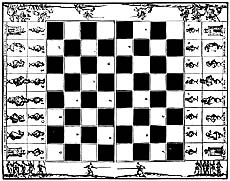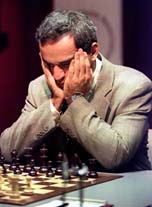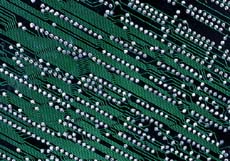
This week Deep Blue, the IBM supercomputer, won a six-game match against world chess champion Garry Kasparov, probably the best player in the history of the game. It's the first time a computer has beaten a human champion in such a match. Like the recent discovery that adult mammals (such as us) can be cloned (see Slate's "The Week/The Clones"), Deep Blue's victory has prompted a flurry of debate about its import and consequences. Here are some of the reactions, in order of ascending sophistication.
1. Computers are conquering us. This is the crudest and most common reaction. "Man vs. Machine ... The Brain's Last Stand," trumpeted the cover of Newsweek. In this view, machines first took over our muscular functions, such as transportation, and are now supplanting our mental functions. How is this possible? Can computers think? Many reporters didn't even think to raise that question.
2. Deep Blue is just a fancy calculator. This is the simplest critique. All Deep Blue does is crunch numbers. A human player considers three or four options and picks the one that will put him in the best position two moves later. Deep Blue considers 200 million positions per second and picks the option that will put it in the best position 10 moves later. The machine isn't surpassing or even matching the human player in its grasp of the flow of the game or the relations among the pieces. It's just processing a lot more data a lot faster.
3. Deep Blue displays intelligence. Kasparov and others cite as evidence: finesse (playing a quiet move with a subtle payoff instead of a bold move with an obvious payoff); coherent strategy (a long series of moves that make sense together, as opposed to the choppy, ad hoc moves for which computers are notorious); and appreciation of subtle positional problems (e.g., the overextension of one's pieces), the existence and value of which are very difficult, if not impossible, to ascertain mathematically.
4. These signs of "intelligence" are just artifacts of calculation. Subtlety? The computer wowed Kasparov by choosing a quiet pawn move instead of a devastating queen move in Game 2. Afterward, a printout of the computer's reasoning showed that it had simply looked ahead and noticed that the distant consequences of the pawn move were better. Coherent strategy? True, a machine that sees 10 moves ahead doesn't have to adjust its strategy as often as a machine that sees four moves ahead. But this is just a difference of degree. Why do we impute human intelligence to these feats? Sheer vanity. Simone de Beauvoir once remarked that women who excel are accused of being men. Likewise, machines that excel are accused of being human.
5. The match wasn't a true measure of Deep Blue's superiority, because Kasparov simply lost his composure. This is the favorite excuse of Kasparov and several other grandmasters. Kasparov says he was traumatized by his loss in Game 2 and never recovered his confidence. By Game 5, he was completely demoralized, and in Game 6, he resigned after just 19 moves. He insists he was defeated not by Deep Blue's prowess but by his own fear, dismay, and exhaustion. As the Boston Globe sympathetically puts it, "Kasparov was beaten by the enemies within."
6. Kasparov's loss of composure is a true measure of Deep Blue's superiority. Kasparov's trademark is his ability to destroy the composure of his opponents. Deep Blue simply beat him at his own game. It coolly parried his attacks, making no mistakes, and rattled him with moves he hadn't anticipated. "Its inscrutable face gave nothing away," marveled the New York Times. It "exhibited qualities of scrupulous care, unshakable calm and remarkable powers of concentration and endurance." It "never agonized, was never tired, never showed joy or disappointment." Requisite cultural reference: The Terminator.

7. The match wasn't a true measure of Deep Blue's superiority, because Kasparov didn't play in his usual style. This is another version of argument No. 5. Like a politician, the champ blames his defeat on his advisers. He says they persuaded him to scrap his usual playing style in order to surprise the computer and keep it off-balance. In doing so, he lost his way. But again: Cowing one's opponent into changing his style is a time-honored method of winning at chess.
8. Deep Blue's team cheated. Kasparov points out that he had no way of knowing whether the machine was secretly getting help. He suggests that its engineers may have tampered with it during the match. (For more on Kasparov's whining, see Slate's "Sore Loser.") The media have taken this complaint seriously, failing to notice that it makes about as much sense as accusing a race-car driver of pedaling. Requisite cultural references: The man behind the curtain in The Wizard of Oz; also, "the Turk," the 18th century chess-playing "machine" that secretly housed a dwarf.
9. Deep Blue isn't intelligent, because it can't theorize and adapt. This is a more sophisticated version of argument No. 2. As Washington Post writer (and Slate contributor) Joel Achenbach explains: "Kasparov can create a model in his head of Deep Blue's 'personality'--he can figure out the machine's bad habits. Then he can adapt. Machines aren't nearly as flexible and crafty as humans. They never learn."
10. Deep Blue can theorize and adapt. Discerning patterns among reams of data is precisely the task for which IBM markets its RS/6000 line (which Deep Blue represents). Indeed, one of Kasparov's chief complaints is that the IBM team crammed Deep Blue full of knowledge of his past games, so that it anticipated his usual tricks and knew how to beat him at them. Certainly, Deep Blue theorized and adapted better than Kasparov did. After beating the machine last year, Kasparov boasted that he had figured out its tactics and outwitted it. But in this year's rematch with an upgraded version of the machine, he agonized over his inability to find weaknesses. "Kasparov himself must have studied the games played last year," writes Vishwanathan Anand, one of the world's top players. "However, humans can't change their style drastically like computers." True, Deep Blue's handlers specifically prepped it to play its opponent. But Kasparov's handlers did the same thing.
11. Chess is a poor test of intelligence. This is the insight that separates intelligent commentators from their inferiors. Many visitors to IBM's Web site came to this conclusion after the match. Chess is easy for computers. It has just two players, 32 pieces, and 64 squares. The board and rules are clearly delineated, as is the single goal: checkmate. Compare this with the complexity of playing golf, running for office, discussing theology, or writing a novel. Why did we think chess was the ultimate test of mental sophistication? Because it exhausts our ability to calculate? How unsophisticated.
12. Computers can't be intelligent, because they lack emotion. Many theorists now agree that thought depends on memories, and memories are bound together in the brain by emotions. Moreover, as Washington Post columnist Richard Cohen points out, math nerds such as Deep Blue are "stunningly dull" about psychological and social phenomena. "Really smart people have a sense of humor," argues Cohen. Danny Hillis, who invented the massive parallel-computing technology illustrated by Deep Blue, captures the point in Newsweek: "Our monopoly on rationality is in peril, and it is time to move our sense of self-worth to a higher perch." Requisite cultural references: The Tinman in The Wizard of Oz, and Data, the human-wannabe Star Trek android.
13. Computers can't be intelligent, because they lack self-consciousness. This theory boils down to two words: tech support. Deep Blue needs handlers to diagnose and correct its failures, because it can't diagnose and correct them itself (though it can be programmed to adjust its behavior in response to pre-defined problems or setbacks). "When anything goes wrong with today's computers, they either grind to a halt or spew out nonsense," observes the New York Times. Cultural counterreference: HAL, the paranoid computer in 2001: A Space Odyssey.
14. Computers can't be intelligent, because they can't transcend prescribed tasks. This combines arguments 9 and 13. Deep Blue doesn't understand that chess is just a game and that there's more to life. (Many human players don't, either, but that's another story.) Kasparov's ultimate triumph, as Cohen points out, was his decision to resign the last game and storm out of the room. He decided the game was no longer worthwhile, and that he would rather spend his time doing something else--a judgment, indeed a concept, of which Deep Blue remains incapable.
15. Intelligence is a poor test of superiority. So what if computers aren't as creative as we are? They can still outwork us and take our jobs. Consider this excerpt from a smug Los Angeles Times editorial: "Deep Blue may beat Kasparov, but can it get a joke? Or contemplate the notion of justice? Uh-uh, checkmate." Checkmate? When was the last time you won a promotion by contemplating the notion of justice? The Times' news coverage of the match was less sanguine. While post-match Web chatters consoled themselves with game theorist John von Neumann's long-ago prediction that computers could handle chess because it was a mere "computation," the Times reporter noted that von Neumann had also classified law and economics, among other endeavors, as "computations." Remember phone operators? They were more intelligent than computers, but that didn't stop AT&T from eliminating 85 percent of them, with the help of computers. Requisite historical reference: John Henry, the 19th century digger who died of exhaustion after racing a steam-powered drill to prove humans' superiority.
16. The computer is a pawn of human masters. "In the End, Still a Pawn," cracked the Los Angeles Times. We didn't lose to Deep Blue; we built it. Humans constructed and programmed it. Human grandmasters tested it, discerned subtle weaknesses, and helped programmers correct them. It's like teaching your son to pitch and then seeing him win the World Series. IBM has been selling this spin from Day 1. They don't want to be seen as the bad guys. Deep Blue's victory "shows what technology can do for man," says C.J. Tan, who heads IBM's Deep Blue team. The Wall Street Journal agrees, dismissing the man vs. machine hype as technophobic "Sierra Club thinking."

17. The computer's human masters are pawns in a corporate chess game. Tan, his colleagues, and the grandmasters who coached Deep Blue weren't paid by humankind. They were paid by IBM. The company spent around $5 million to build the machine, program it, conduct the chess match, and pay the prize money. Marketing analysts put the match's publicity value at about $150 million. It attracted more than 300 reporters and 4 million visitors on the Internet. The day after Deep Blue's victory, IBM's stock price broke through its all-time high. Deep Blue might now headline IBM's ad campaign for the RS/6000, which it is peddling to businesses as a manager of inventories, mailing lists, and other databases. More important, Deep Blue upgrades IBM's image from rusty to cutting-edge. The New York Times predicts Deep Blue could supplant Bill Gates as the "media star" celebrated for "personifying the geeky glamour of the computer revolution."
18. Kasparov was the ultimate pawn. He poses as humanity's champion on the cover of Newsweek, and he earned $400,000 for playing the match, but one wag offered a less flattering characterization of his role: debugger. He has now performed this humble service for IBM a dozen times. More important, he has given the company a level of prestige and publicity no other opponent could have generated. Every three years, the world's best human players have to square off in a grueling tournament to determine which of them gets the honor of challenging Kasparov for his title. Deep Blue, meanwhile, has had a clear shot at him in each of the last two years. And it's no secret that IBM refined the machine specifically to beat him.
19. Kasparov can play that game, too. This is a corollary of argument No. 14. Unlike Deep Blue, Kasparov is intelligent and can transcend his prescribed task, which in this case was to debug and promote Deep Blue. For all his bitching and whining at the post-match press conference, he correctly perceived that "a big corporation with unlimited resources" had programmed its machine to beat him. "It [had] nothing to do [with] science," he observed. Afterward, an aide said Kasparov would challenge Deep Blue to a rematch in the next few months. Kasparov intends to do what Deep Blue cannot: change the rules. He wants more time between games so that he can rest. He wants printouts of Deep Blue's deliberations, so he can study its habits the way the IBM team studied his own. And this time, he won't let IBM sponsor the match.
20. The ultimate game is to transcend the game. Kasparov may still be the world champion in name, but IBM is now calling the shots. Kasparov's nemesis, former champion Anatoly Karpov, has already requested "the chance to uphold the honor of mankind's chess players" against Deep Blue. Other grandmasters have lined up behind Karpov. IBM reportedly is considering its options. As long as they're jockeying for the right to challenge Deep Blue, Kasparov and his human rivals are playing IBM's game. We'll find out if they're smart enough to stop.
